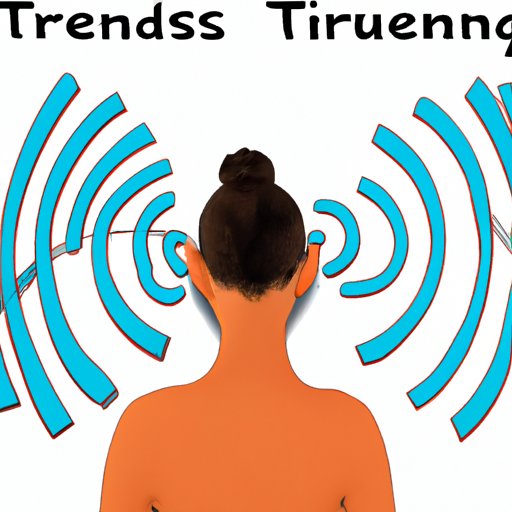Introduction
Tinnitus is the sensation of hearing ringing or other noises in your ears when no external sound is present. It can be intermittent or continuous and vary in pitch from a low roar to a high squeal. Tinnitus can be caused by a variety of factors including exposure to loud noises, age-related hearing loss, earwax buildup, or even a side effect of certain medications. Although there is no cure for tinnitus, there are steps you can take to reduce the severity of your symptoms and make living with tinnitus more manageable.
Purpose of Article
This article will explore the various ways you can stop ringing in your ears. We’ll discuss identifying the cause of your tinnitus, how to avoid loud noises, using hearing protection, managing stress and anxiety, trying sound therapy, getting regular exercise, and seeking professional help. By the end of this article, you should have a better understanding of how to stop ringing in your ears.
Identify the Cause of Your Tinnitus
The first step to stopping the ringing in your ears is to identify the cause. This can be done through a physical exam and audiologic testing. During the physical exam, your doctor will look inside your ear canal for signs of infection, impacted earwax, or other issues that could be causing your tinnitus. Audiologic testing allows your doctor to determine the type and degree of hearing loss you may have, as well as the frequency and pitch of your tinnitus.
Avoid Loud Noises
Exposure to loud noises can worsen tinnitus symptoms and make the ringing in your ears worse. Common sources of loud noise include machinery, power tools, firearms, music concerts, and sporting events. To reduce your exposure to loud noises, make sure to wear hearing protection such as earplugs or earmuffs whenever possible. If you’re attending a loud event, try to stay at least 15 feet away from the speakers to minimize your risk of hearing damage.
Use Hearing Protection
Hearing protection can help protect your ears from further damage and can reduce the severity of your tinnitus symptoms. There are many types of hearing protection available, including earplugs, earmuffs, and custom-fitted earpieces. When deciding which type of hearing protection to use, consider the level of noise you’ll be exposed to and the length of time you’ll be exposed to it. For example, if you’re going to be exposed to loud noises for an extended period of time, you should opt for a higher-quality pair of earmuffs.
Manage Stress and Anxiety
Stress and anxiety can worsen tinnitus symptoms and make the ringing in your ears even harder to ignore. To reduce stress and anxiety, try practicing deep breathing exercises, meditation, yoga, or other relaxation techniques. You can also try talking to a friend or family member about your worries, or writing down your thoughts in a journal. Finally, make sure to get plenty of sleep and exercise regularly to keep your body and mind healthy.
Try Sound Therapy
Sound therapy is another way to reduce the severity of tinnitus symptoms. This type of therapy involves exposing yourself to soothing sounds such as white noise, nature recordings, or music. Over time, these sounds can help reduce the intensity of the ringing in your ears. You can find sound therapy recordings online or purchase special sound machines designed to help with tinnitus.
Get Regular Exercise
Regular exercise can help reduce stress and anxiety, improve sleep quality, and boost overall health. Try to fit in at least 30 minutes of moderate exercise five days a week, such as walking, jogging, cycling, swimming, or yoga. Exercise can also help reduce the severity of tinnitus symptoms, so make sure to incorporate it into your daily routine.
Seek Professional Help
If your tinnitus is severe or long-lasting, you may want to consult a tinnitus specialist or audiologist. A tinnitus specialist can help you identify the underlying cause of your tinnitus and recommend appropriate treatments such as cognitive behavioral therapy, sound therapy, or lifestyle changes. If your tinnitus is caused by an underlying medical condition, your doctor may recommend medications or surgery to treat the condition.
Conclusion
Tinnitus can be a frustrating and debilitating condition. However, there are steps you can take to reduce the severity of your symptoms and make living with tinnitus more manageable. Start by identifying the cause of your tinnitus, avoiding loud noises, using hearing protection, managing stress and anxiety, trying sound therapy, getting regular exercise, and seeking professional help. With the right treatment plan, you can learn to cope with your tinnitus and live a happy, healthy life.
Further Resources
American Tinnitus Association: https://www.ata.org/
Mayo Clinic: https://www.mayoclinic.org/diseases-conditions/tinnitus/symptoms-causes/syc-20350156
National Institute on Deafness and Other Communication Disorders: https://www.nidcd.nih.
(Note: Is this article not meeting your expectations? Do you have knowledge or insights to share? Unlock new opportunities and expand your reach by joining our authors team. Click Registration to join us and share your expertise with our readers.)
